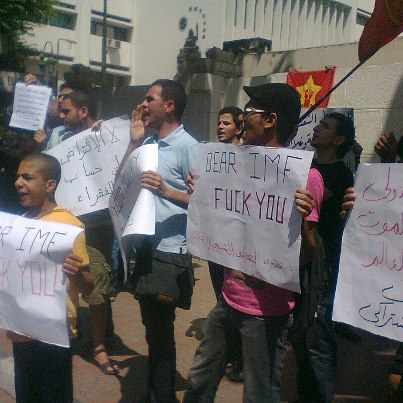Latest NEWS
- Aswat Masriya, the last word
- Roundup of Egypt's press headlines on March 15, 2017
- Roundup of Egypt's press headlines on March 14, 2017
- Former Egyptian President Hosni Mubarak to be released: lawyer
- Roundup of Egypt's press headlines on March 13, 2017
- Egypt's capital set to grow by half a million in 2017
- Egypt's wheat reserves to double with start of harvest -supply min
- Roundup of Egypt's press headlines on March 12, 2017
Egypt to project huge fuel price rises in IMF talks-Source

A march against the IMF loan to Egypt - photo from the Popular Alliance Facebook page
By Marwa Awad
CAIRO, March 3 (Reuters) - Egypt is sending projections to the International Monetary fund (IMF) of sharp increases in gasoline and diesel prices as it comes under pressure to curb soaring energy subsidies, a cabinet official said on Sunday.
The government plans to continue subsidised fuel prices for the most needy under a rationing system to be implemented in July. However, Egyptians excluded from this scheme would face a jump in prices that could provoke an angry reaction if implemented.
Cairo has produced an economic reform plan on the basis of which it wants to negotiate a $4.8 billion loan deal with the IMF, aiming to halt a slide in its foreign currency reserves, although no date has yet been set for talks.
Fuel prices would remain modest by international standards but diesel, for example, would increase almost five-fold. Last year the government withdrew planned tax increases due to a wave of street violence.
The official, who is part of the cabinet's economic team, told Reuters the increases would be put to an IMF team once it arrived to Cairo to negotiate the loan. "The new prices are included in the economic reform programme that will be presented to the IMF mission," said the official, who requested anonymity.
Cabinet spokesman Alaa Hadidy declined comment on future prices. "As of today there are no price increases on energy or fuel and I will not speculate about the future," he said.
SUBSIDISED FUEL
Petroleum Minister Osama Kamal was quoted by the government news agency MENA as describing the figures, which were also published in a local newspaper, as "estimates" and said that no decisions had yet been made.
The government plans to continue selling subsidised fuel, but in limited amounts to holders of new smart cards. Details have yet to be announced, but officials have said they would be issued to owners of vehicles with engines below a certain size that has yet to be determined.
It also remained unclear how much subsidised fuel the smart card holders would be entitled to.
Kamal said that smart card prices would not rise from current levels.
However, costs outside this scheme would jump if subsidies are removed, the official said. According to the projections, the most commonly used 90 octane gasoline would leap to 5.71 Egyptian pounds ($0.85) a litre from 1.75, while diesel would go up to 5.21 pounds from 1.10.
Last year the government deregulated prices of 95 octane gasoline, typically used by wealthier owners of bigger cars.
In the programme, the government forecast the budget deficit would soar to 12.3 percent of annual economic output in the year to June without the implementation of reforms. Energy subsidies swallow 20 percent of the budget and that burden is rising as a slide in the Egyptian pound pushes up the cost of imported oil.
On Saturday, a senior U.S. official accompanying visiting Secretary of State John Kerry said Washington believed Egypt needed to increase tax revenue and cut energy subsidies to secure the IMF loan. ($1 = 6.7403 Egyptian pounds) (Editing by David Stamp and David Holmes)










